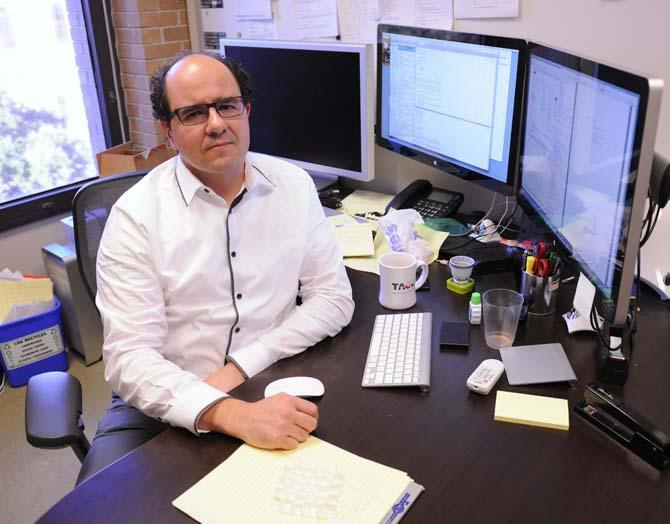The University’s Center for Computation and Technology moved out of the the old dormitory, Johnston Hall, and into the newly constructed Digital Media Center and pursued many multi-discipline research efforts this semester.
CCT assistant director James Lupo said the new building is infinitely better than their old location after his first week in the DMC.
In the past year, the CCT won several grants for major projects. The United States Department of Energy awarded $7.05 million grant to the CCT and other partners to help advance extreme-scale computing. High-Performance Parallel and Distributed Computing , a premier computer science conference for presenting research, awarded several of the faculty members with its Top Paper awards.
This semester, several individual projects have come to fruition.
Associate professor of computer science and CCT faculty member Brygg Ullmer is the principal investigator of the Melete project. Melete is a supercomputer and part of a four-year research collaboration with Southern University. Machines like Melete will help the growing film industry in Baton Rouge by attracting the necessary human resources to make a film said Ullmer.
Assistant professor in the School of Art and Center for Computation and Technology faculty member Derick Ostrenko said Melete lets students complete projects in hours that would previously take days.
This supercomputer — along with the University’s others SuperMIC and SuperMike II — open up many research possibilities and practical applications.
Michal Brylinski, assistant professor of biological sciences with a joint CCT appointment, and his research group use SuperMIC for investigating possible models of a broad spectrum antibiotic.
Blaise Bourdin, assistant professor of mathematics with a joint CCT appointment, uses SuperMike II to conduct research on more productive means of harvesting geothermal energy. Bourdin’s project procured over $700,000 in funding from sources like the National Science Foundation and Chevron.
The CCT hosts many events and lectures for faculty to present their research to the community, and gives students opportunities to learn from professionals in the digital media industry.
Marc Aubanel, director of Digital Arts and Media at the CCT, will be starting a new digital arts and engineering masters degree program to meet the growing video game industry in Louisiana, projected to be available by next fall. Only 44 available advanced degree programs like this exist in the United States currently.
Aubanel also created a monthly film series where popular films are screened followed by a presentation by a film industry professional. This semester, the series showed “District 9”, “RED” and “Star Trek Into Darkness” with special effects professionals highlighting techniques used to create scenes and giving the audience a chance to ask questions.
The CCT also hosted Justin Manor, an entrepreneur, Massachusetts Institute of Technology graduate and co-founder of graphic design company Sosolimited, for an interactive programming workshop on how to visualize political speeches.
On Dec. 7, the University became the first university in the United States to host the New Zealand born event, Programming Challenge for Girls. The event provides an opportunity for 9th and 10th grade girls to learn about computer programming applications, with intentions of exposing more people to the practicality of the field.
The CCT will continue its networking and outreach programs next semester with the Global Game Jam in January and Scientific Computing around Louisiana conference in February.
We want to overcome the idea that programming only impacts machines and not people said Kathy Traxler, CCT outreach and training specialist.
Center for Computation and Technology benefits from move
By Renee Barrow
December 9, 2013
Blaise Bourdin, LSU Department of Mathematics associate professor and Center for Computation and Technology adjunct faculty, received a grant from Chevron to conduct research about energy from Earth’s core.




